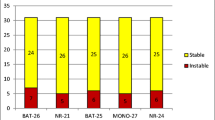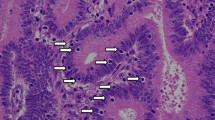Abstract
Objective
Colorectal cancer is the leading cause of cancer death in Puerto Rico and third among Hispanics in the USA. Up to 2–4% of colorectal cancer cases are a result of Lynch syndrome (LS), a hereditary cancer syndrome caused by a germline mutation in at least one of the DNA mismatch repair genes. The objective of this study was to determine the prevalence of LS in colorectal tumors during the first 15-months after the implementation of universal tumor-based screening for LS in Puerto Rico.
Methods
A total of 317 colorectal tumors were evaluated in a large private pathology laboratory from September 2014 to December 2015. Clinical characteristics were obtained from the pathology reports. Unadjusted and adjusted logistic regression models were used to estimate the magnitude of association (odds ratio [OR] with 95% confidence intervals [CI]) between absent MMR protein expression and patient characteristics.
Results
Most cases (93.4%) were analyzed by immunohistochemistry; 11.8% (35 of 296) had deficient mismatch repair protein expression. While 29 of the 317 cases were subjected to PCR-based microsatellite instability analysis of which 10.3% (3 of 317) had microsatellite instability. In total, 11.0% of the tumors were reported MMR deficient. These tumors were more likely from females and more likely localized in the proximal colon compared to those with proficient MMR expression.
Conclusions
Our data is consistent with the results from other studies including US Hispanics, where approximately 10% of Hispanic individuals with colorectal cancer have microsatellite instability. Our results support universal tumor-based screening for LS among Hispanics in accordance with National Comprehensive Cancer Network guidelines.


Similar content being viewed by others
Availability of Data and Materials
The data obtained and analyzed on the current study is available from the corresponding author on reasonable request.
References
Coussens LM, Werb Z. Inflammation and cancer. Nature. 2002;420(6917):860–7.
Data Source: Incidence case file from the Puerto Rico Central Cancer Registry (August 21,2019).
Stoffel EM, Mangu PB, Gruber SB, Hamilton SR, Kalady MF, Lau MW, et al. Hereditary colorectal cancer syndromes: American Society of Clinical Oncology Clinical Practice Guideline endorsement of the familial risk-colorectal cancer: European Society for Medical Oncology Clinical Practice Guidelines. J Clin Oncol. 2015;33(2):209–17.
Hampel H, Frankel WL, Martin E, Arnold M, Khanduja K, Kuebler P, et al. Feasibility of screening for Lynch syndrome among patients with colorectal cancer. J Clin Oncol. 2008;26(35):5783–8.
Hampel H, Frankel WL, Martin E, Arnold M, Khanduja K, Kuebler P, et al. Screening for the Lynch syndrome (hereditary nonpolyposis colorectal cancer). N Engl J Med. 2005;352(18):1851–60.
Salovaara R, Loukola A, Kristo P, Kääriäinen H, Ahtola H, Eskelinen M, et al. Population-based molecular detection of hereditary nonpolyposis colorectal cancer. J Clin Oncol. 2000;18(11):2193–200.
Lynch HT, de la Chapelle A. Hereditary colorectal cancer. N Engl J Med. 2003;348(10):919–32.
Umar A, Boland CR, Terdiman JP, Syngal S, Chapelle A, Ruschoff J, et al. Revised Bethesda guidelines for hereditary nonpolyposis colorectal cancer (Lynch syndrome) and microsatellite instability. J Natl Cancer Inst. 2004;96(4):261–8.
Aaltonen LA, Salovaara R, Kristo P, Canzian F, Hemminki A, Peltomäki P, et al. Incidence of hereditary nonpolyposis colorectal cancer and the feasibility of molecular screening for the disease. N Engl J Med. 1998;338(21):1481–7.
Aarnio M, Mecklin JP, Aaltonen LA, Nyström-Lahti M, Järvinen HJ. Life-time risk of different cancers in hereditary non-polyposis colorectal cancer (HNPCC) syndrome. Int J Cancer. 1995;64(6):430–3.
Win AK, Young JP, Lindor NM, Tucker KM, Ahnen DJ, Young GP, et al. Colorectal and other cancer risks for carriers and noncarriers from families with a DNA mismatch repair gene mutation: a prospective cohort study. J Clin Oncol. 2012;30(9):958–64.
National Comprehensive Cancer Network. Genetics/familial high-risk assessment: colorectal. 2017 [cited 2017 08/21/17]; V2.2017:[Available from: www.nccn.org.
Stoffel E, Mukherjee B, Raymond VM, Tayob N, Kastrinos F, Sparr J, et al. Calculation of risk of colorectal and endometrial cancer among patients with Lynch syndrome. Gastroenterology. 2009;137(5):1621–7.
Hsieh P, Yamane K. DNA mismatch repair: molecular mechanism, cancer, and ageing. Mech Ageing Dev. 2008;129(7–8):391–407.
Aaltonen LA, et al. Clues to the pathogenesis of familial colorectal cancer. Science. 1993;260(5109):812–6.
Sameer AS, Nissar S, Fatima K. Mismatch repair pathway: molecules, functions, and role in colorectal carcinogenesis. Eur J Cancer Prev. 2014;23(4):246–57.
Michailidi C, Papavassiliou AG, Troungos C. DNA repair mechanisms in colorectal carcinogenesis. Curr Mol Med. 2012;12(3):237–46.
Vasen HF, Blanco I, Aktan-Collan K. Revised guidelines for the clinical management of Lynch syndrome (HNPCC): recommendations by a group of European experts. Gut. 2013.
Giardiello FM, Allen JI, Axilbund JE, Boland RC, Burke CA, Burt RW, et al. Guidelines on genetic evaluation and management of Lynch syndrome: a consensus statement by the US Multi-society Task Force on colorectal cancer. Am J Gastroenterol. 2014;109(8):1159–79.
Morrison J, Bronner M, Leach BH, Downs-Kelly E, Goldblum JR, Liu X. Lynch syndrome screening in newly diagnosed colorectal cancer in general pathology practice: from the revised Bethesda guidelines to a universal approach. Scand J Gastroenterol. 2011;46(11):1340–8.
Perez-Carbonell L, et al. Comparison between universal molecular screening for Lynch syndrome and revised Bethesda guidelines in a large population-based cohort of patients with colorectal cancer. Gut. 2012;61(6):865–72.
Sierra I, et al. Implementation of Universal Colorectal Cancer Screening for Lynch Syndrome: A Population-Based Study. in AACR Science of Health Disparities. Fort Lauderdale: AACR; 2016.
Shaikh T, Handorf EA, Meyer JE, Hall MJ, Esnaola NF. Mismatch repair deficiency testing in patients with colorectal cancer and nonadherence to testing guidelines in young adults. JAMA Oncol. 2018;4(2):e173580.
Karlitz JJ, Hsieh MC, Liu Y, Blanton C, Schmidt B, Jessup MJ, et al. Population-based Lynch syndrome screening by microsatellite instability in patients </=50: prevalence, testing determinants, and result availability prior to colon surgery. Am J Gastroenterol. 2015;110(7):948–55.
Muller C, Lee SM, Barge W, Siddique SM, Berera S, Wideroff G, et al. Low referral rate for genetic testing in racially and ethnically diverse patients despite universal colorectal cancer screening. Clin Gastroenterol Hepatol. 2018;16(12):1911–1918.e2.
Ashktorab H, Ahuja S, Kannan L, Llor X, Ellis NA, Xicola RM, et al. A meta-analysis of MSI frequency and race in colorectal cancer. Oncotarget. 2016;7(23):34546–57.
Berera S, Koru-Sengul T, Miao F, Carrasquillo O, Nadji M, Zhang Y, et al. Colorectal tumors from different racial and ethnic minorities have similar rates of mismatch repair deficiency. Clin Gastroenterol Hepatol. 2016;14(8):1163–71.
Ricker CN, Hanna DL, Peng C, Nguyen NT, Stern MC, Schmit SL, et al. DNA mismatch repair deficiency and hereditary syndromes in Latino patients with colorectal cancer. Cancer. 2017;123(19):3732–43.
Boland CR, Thibodeau SN, Hamilton SR, Sidransky D, Eshleman JR, Burt RW, et al. A National Cancer Institute Workshop on Microsatellite Instability for cancer detection and familial predisposition: development of international criteria for the determination of microsatellite instability in colorectal cancer. Cancer Res. 1998;58(22):5248–57.
Evaluation of Genomic Applications in, P. and G. Prevention Working, Recommendations from the EGAPP Working Group: genetic testing strategies in newly diagnosed individuals with colorectal cancer aimed at reducing morbidity and mortality from Lynch syndrome in relatives. Genet Med. 2009;11(1):35–41.
Syngal S, Brand RE, Church JM, Giardiello FM, Hampel HL, Burt RW, et al. ACG clinical guideline: genetic testing and management of hereditary gastrointestinal cancer syndromes. Am J Gastroenterol. 2015;110(2):223–62 quiz 263.
Rubenstein JH, et al. American Gastroenterological Association Institute Guideline on the Diagnosis and Management of Lynch Syndrome. Gastroenterology. 2015;149(3):777–82 quiz e16–7.
Julie C, et al. Identification in daily practice of patients with Lynch syndrome (hereditary non-polyposis colorectal cancer): revised Bethesda guidelines-based approach versus molecular screening. Am J Gastroenterol. 2008;103:2825–35.
Moreira L, Balaguer F, Lindor N, de la Chapelle A, Hampel H, Aaltonen LA, et al. Identification of Lynch syndrome among patients with colorectal cancer. JAMA. 2012;308(15):1555–65.
Brennan B, Hemmings CT, Clark I, Yip D, Fadia M, Taupin DR. Universal molecular screening does not effectively detect Lynch syndrome in clinical practice. Ther Adv Gastroenterol. 2017;10(4):361–71.
Gupta S, Ashfaq R, Kapur P, Afonso BB, Nguyen TPT, Ansari F, et al. Microsatellite instability among individuals of Hispanic origin with colorectal cancer. Cancer. 2010;116(21):4965–72.
De Jesus-Monge WE, et al. Mismatch repair protein expression and colorectal cancer in Hispanics from Puerto Rico. Familial Cancer. 2010;9(2):155–66.
Iacopetta B, Grieu F, Amanuel B. Microsatellite instability in colorectal cancer. Asia Pac J Clin Oncol. 2010;6(4):260–9.
Kane MF, Loda M, Gaida GM, Lipman J, Mishra R, Goldman H, et al. Methylation of the hMLH1 promoter correlates with lack of expression of hMLH1 in sporadic colon tumors and mismatch repair-defective human tumor cell lines. Cancer Res. 1997;57(5):808–11.
Lochhead P, Kuchiba A, Imamura Y, Liao X, Yamauchi M, Nishihara R, et al. Microsatellite instability and BRAF mutation testing in colorectal cancer prognostication. J Natl Cancer Inst. 2013;105(15):1151–6.
Cruz-Correa M, Diaz-Algorri Y, Pérez-Mayoral J, Suleiman-Suleiman W, del Mar Gonzalez-Pons M, Bertrán C, et al. Clinical characterization and mutation spectrum in Caribbean Hispanic families with Lynch syndrome. Familial Cancer. 2015;14(3):415–25.
Cruz-Correa M, et al. Clinical Cancer genetics disparities among Latinos. J Genet Couns. 2017;26(3):379–86.
Engstrom PF, Arnoletti JP, Benson AB 3rd, Chen YJ, Choti MA, Cooper HS, et al. NCCN clinical practice guidelines in oncology: colon cancer. J Natl Compr Cancer Netw. 2009;7(8):778–831.
Acknowledgments
The authors would like to thank the University of Puerto Rico/MD Anderson Cancer Center Partnership’s Data and Omics Sciences Core for their support and critical reading of the manuscript.
Funding
The research reported in this publication was partially supported by the Biostatistics, Epidemiology and Bioinformatics Core (BEBiC), now Data and Omics Sciences Core (DATAOmics), of the University of Puerto Rico/MD Anderson Cancer Center Partnership for Excellence in Cancer Research under Award Grant Number CA096297/CA096300 from the National Cancer Institute (NCI), by the National Institute on Minority Health and Health Disparities (NIMHD) and the National Institute of Allergy and Infectious Diseases (NIAID) of the National Institutes of Health under Award Number U54MD007587, and by the Comprehensive Cancer Center of the UPR (a public corporation of the Government of Puerto Rico created in virtue of Law 230 of August 26, 2004 as amended). The content is solely the responsibility of the authors and does not necessarily represent the official views of the National Institutes of Health.
Author information
Authors and Affiliations
Contributions
IS, MCC, YDA, and KR conceived the study and participated in its design. IS, JPM, KAZ, and MCC participated in the design of the study and drafted the manuscript. VA, JSP, MT, LT, MLA, VICC, and SRQ participated in the coordination of data gathering. All authors read and approved the final manuscript.
Corresponding author
Ethics declarations
Conflict of Interest
The authors have no conflicts of interest to report. MCC is in an advisory board for EXACT Sciences and BeiGene Pharmaceutical.
Ethics Approval and Consent to Participate
The study was approved by the University of Puerto Rico Medical Sciences Campus Institutional Review Board.
Consent for Publication
Not applicable.
Additional information
Publisher’s Note
Springer Nature remains neutral with regard to jurisdictional claims in published maps and institutional affiliations.
Rights and permissions
About this article
Cite this article
Sierra, I., Pérez-Mayoral, J., Rosado, K. et al. Implementation of Universal Colorectal Cancer Screening for Lynch Syndrome in Hispanics Living in Puerto Rico. J. Racial and Ethnic Health Disparities 8, 1185–1191 (2021). https://doi.org/10.1007/s40615-020-00876-7
Received:
Revised:
Accepted:
Published:
Issue Date:
DOI: https://doi.org/10.1007/s40615-020-00876-7




